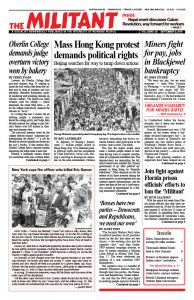Lawyers for Oberlin College filed post-trial motions Aug. 14 seeking to quash the trial verdict that found the college and its dean of students and vice president, Meredith Raimondo, guilty of slandering and wreaking damage on Gibson’s bakery. The family-run small business sued the college — which dominates the small Ohio town — after the college maliciously smeared the Gibsons as “racist.”
In a ruling that was a victory for all working people, a unanimous jury found the college guilty and Judge John Miraldi ordered the college to pay Gibson’s bakery over $30 million in damages and attorneys fees.
The post-trial motions listed on the college website request “judgment notwithstanding the verdict” — a call for Miraldi to reverse himself and throw out the jury’s verdict. If that motion fails, Oberlin College filed a separate motion requesting the judge order a new trial.
Oberlin, a nationally known liberal arts institution with over a billion dollar endowment, has made it clear it intends to wage a protracted and expensive appeals fight, one that could result in the Gibsons being driven out of business before the case is ever settled. The bakery owners have 14 days to respond and the court says it will rule Sept. 9.
A Lorain County jury found the college and Raimondo orchestrated protests outside the Gibson’s store, smearing the bakery owners as racists, claiming — without ever producing a single piece of evidence — that they had a long history of racial profiling. The college also backed a boycott campaign that damaged the small business. Raimondo encouraged, organized and accompanied hundreds of students over two days of actions outside the store after the arrest of three Black students who had attempted to steal from the bakery.
All three of the students pled guilty to misdemeanor charges and stated in court that no racism was involved in Gibson’s response to the theft.
“I hope we rain fire and brimstone on that store,” texted interim Assistant Dean of Students Antoinette Myers to Raimondo when the three students that stole from the bakery submitted their guilty pleas. And that is exactly what the college has been doing.
College officials refused the Gibsons’ request from the beginning that the administration issue a statement acknowledging that the Gibsons are not racists and had no record of racial profiling. When the case went to trial they attempted to get the Gibsons to give up the fight by dragging out the trial proceedings, conducting 32 depositions, including some lasting several days.
With disdain for working people in Lorain County, where Oberlin is located, the college’s legal brief claims it “could not (and did not) receive a fair trial in Lorain County.” They had tried to get the trial moved from Lorain, contemptuously claiming the jury pool there was “poisoned.”
The college argues the award of $25 million in damages against it, which it calls “grossly excessive,” was “given under the influence of passion and prejudice.”
It wasn’t “passion and prejudice,” but working-class solidarity that drove the response of many across the region who have supported the Gibsons, disgusted at the college’s race-baiting and attempts to crush the small business. Many came to shop at the store in a show of support and put signs on their lawns backing the family.
College tries to twist the issue
Oberlin’s lawyers claim the slanders of “racism” and racial profiling are simply opinions being expressed by the college’s students, constitutionally protected free speech.
But the Gibsons never sued the students. They sued the college and the dean for what they did in slandering the family as “racist” and damaging their business. During the protest college officials encouraged and let students use college copiers to print flyers, gave them food and drink, cancelled classes and awarded students who took part in the protest with credits. And they cut the Gibson’s contract to supply the college with baked goods.
This is explained in an updated FAQ document provided by Gibsons’ lawyers. It can be viewed at: https://www.lawlion.com/wp-content/uploads/2019/08/UPDATED-FAQs-re-Gibsons-Bakery-v.-Oberlin-College.pdf.
As part of a national effort to push back against the court decision, Oberlin College President Carmen Twillie Ambar told the Wall Street Journal that “you can have two different lived experiences and both those things can be true,” seeking to justify college officials’ continuing attacks on the bakery owners. But the jury made its decision from the material fact that the college helped to organize a campaign to damage the Gibsons.
The jury awarded $44 million in damages to the Gibsons, but this was reduced to $25 million by Miraldi. Ohio state law caps the amount of punitive damages successful plaintiffs can win from a jury.
The Gibsons’ attorneys announced that if the college goes ahead with its appeal and drags out their victimization of the Gibsons, the family will take legal action to overturn the state law and have the jury’s full damage award restored.
Laws passed in a number of states to cap damages have been pushed by wealthy businesses and individuals seeking to limit their liability when they willfully do harm to others. Courts in 13 states have ruled that similar damage restrictions are unconstitutional.

